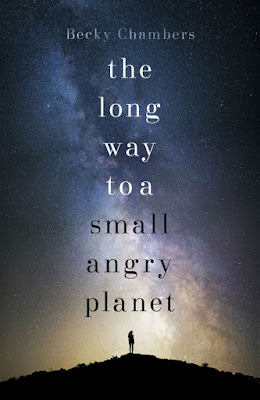When Ashby, Captain of the Wayfarer, takes on a new clerk, not all of the crew think he's made the right decision. Rosemary is young and inexperienced, and this is her first time off her home planet of Mars. But Rosemary is efficient and friendly, if reserved, and does not take long to settle in among the Wayfarer's varied crew. And if she has some secrets she'd rather keep in her past, well, doesn't everyone?
The Wayfarer is not a military ship, nor a diplomatic one, or a rag-tag bunch of crooks evading capture. It's a construction ship whose main job is to build wormholes. The latest job is the biggest yet: a tunnel from an unknown part of the galaxy, to aid an alliance between the Galactic Commons and a somewhat volatile and dangerous tribe. But first, they have to get there...
As the title suggests, The Long Way to a Small Angry Planet is the story of a journey, a character study of a small cast in a confined space (with the occasional stop along the way.) I enjoyed it as a leisurely read, taking my time over the book, and enjoying getting to know the characters and the universe portrayed. The different species are really diverse, not with just one "hat" to mark each one out as different, but with a wide variety of cultures, appearances, beliefs and language styles. This is not an Earth-centric setting; the Humans (from Mars and from the Exodus Fleet outside the Solar System - Earth is all but deserted) are fairly new additions to the Galactic Commons. Dates are measured in tenday periods, which add up to Standards (and I'm pretty sure a day is not the twenty four hours of Earth. Why would it be?) The universal language is Klip. As well as five humans: the Wayfarer's crew includes Sissix, of the very tactile reptilian species Aandrisk, the ship's doctor and cook known as Dr Chef, who is Grum, a near-extinct people who change gender over the course of a lifetime, Ohan, a Sianat Pair, short-lived joined species (comparable to Star Trek's Trill) who are always described in the plural. And Lovey, the AI, who tends to get overlooked but is a much-valued and loved part of the team.
What struck me as remarkable in Small Angry Planet was that this really is a civilian ship. When did you last see an unarmed spaceship in science fiction? Star Trek's Starfleet may claim not to be military, but follows a strong naval tradition, and its exploration starships are heavily armed with phasers and photon torpedoes, which are regularly used. Star Wars is full of lightsabers and blasters. Battlestar Galactica and her fleet are engaged in a desperate fight for survival against the Cylons. Firefly's rebels are armed and fight dirty. But the Exodan humans are pacifists, and Ashby refuses to allow weapons aboard his ship, even for self-defence. It struck me as shocking and sad to realise that violence is taken for granted even in the Utopian futures, and Small Angry Planet is revolutionary just by not arming this tunnelling ship. And it shouldn't be. But being unarmed doesn't always protect them.
What happens when the Wayfarer reaches its destination, while tense, twisty and shocking, is not really the point. It's about the journey, both the long physical voyage in space, and the changes in each of the characters as they change and grow, confront secrets, challenges and dilemmas. They don't always make the right decisions. Some choices will reverberate past the end of the book.
The Long Way to a Small Angry Planet is a really fresh, intelligent and fun science fiction novel. As Stephen King's 11.22.63 affected the way I view time-travel, so Small Angry Planet set a new standard for space-travel stories. And there is a sequel on its way later this year. I usually prefer stand-alone stories to series, but Becky Chambers' universe and characters are too vast, too rich, to be contained within 400 pages. It feels as though we've only just scratched the surface.

Absolutely loved this book and it was nice to have sci-fi without war as the major theme.
ReplyDeleteCan you recommend anything similar?